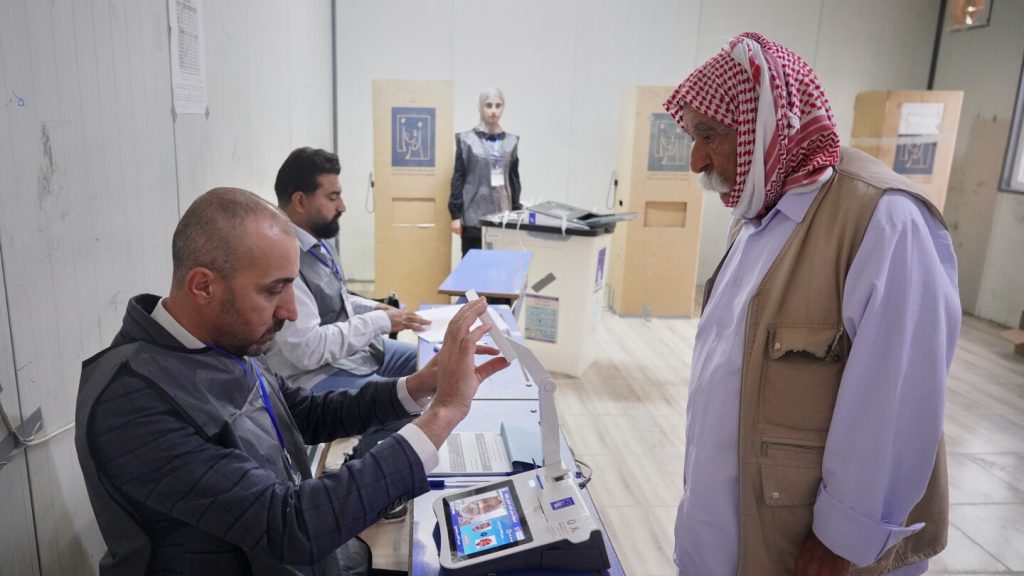Listen to the article
Iraqi Security Forces and Displaced Yazidis Cast Early Ballots in Parliamentary Election
Members of Iraqi security forces and displaced people living in camps, including minority Yazidis, participated in early voting Sunday ahead of Iraq’s parliamentary election scheduled for Tuesday. The election could determine whether Prime Minister Mohammed Shia al-Sudani secures a second term in office.
Approximately 1.3 million army and security personnel, along with 26,000 displaced people, are eligible to participate in early voting. The election features 7,744 candidates, most affiliated with sectarian-aligned political parties, competing for seats in the country’s parliament.
The vote comes at a critical juncture for Iraq, which is carefully balancing its relationships with Iran and the United States amid fears of another potential conflict between Israel and Iran that could destabilize the region.
In a camp near Dohuk, in the semi-autonomous northern Iraqi Kurdish region, Yazidis who fled their homes over a decade ago following brutal attacks by the Islamic State group (ISIS) took part in the electoral process. Many of these displaced voters have been unable to return to their homes due to ongoing political disputes and lack of infrastructure in their home regions.
A polling station established in a small school in Dohuk initially saw little activity early in the morning but gradually filled as voters arrived, some with worn identification cards, others assisting elderly relatives to cast their ballots. Inside the classrooms, party representatives and candidate monitors crowded the space, observing the proceedings.
The Yazidi community was specifically targeted by ISIS militants during their 2014 rampage through Iraq’s Sinjar district in Nineveh province. The extremist group, which considered Yazidis to be heretics, killed and enslaved thousands in what has been recognized internationally as a genocide.
“Eleven years passed and the situation is the same,” said Khedhir Qassim, a displaced Yazidi from Sinjar who voted at the camp in Dohuk. He expressed little faith that new leadership would bring meaningful change to his community’s plight. “We want them to support us and rebuild our areas that are ruined due to their political dispute and where everyone works for their own benefit,” he added.
Though some Yazidis have slowly returned to Sinjar since ISIS’s territorial defeat in Iraq and Syria, many see no viable future there. The region remains caught between competing political interests, with both the central government in Baghdad and authorities in the Kurdish region laying claim to Sinjar and backing rival local governments.
Edris Zozani, another displaced Yazidi voter, said he supported the Kurdish Democratic Party (KDP), one of Iraq’s two main Kurdish political parties with significant influence in Dohuk. “If we have independent Yazidi candidates, they wouldn’t be able to represent us effectively,” he explained. “But if they go to parliament as part of strong lists, like the KDP, they would be in a better position to support the Yazidi community.”
In Baghdad, early voting saw participation from Iraqi soldiers, police officers, and members of the Popular Mobilization Forces (PMF) – a coalition of primarily Shiite, Iran-backed militias that united to fight ISIS. Though formally placed under Iraqi military control in 2016, the PMF continues to operate with significant autonomy.
The status and future of the PMF represents a contentious issue for the incoming parliament, particularly as Baghdad navigates tensions between Washington and Tehran. Iraq’s parliament has been considering legislation that would formalize the relationship between the military and the PMF, a move that has drawn objections from the United States.
“I voted for the list that defends the PMF,” said one militiaman after voting in Baghdad, speaking anonymously as he wasn’t authorized to address journalists. Several armed groups within the PMF structure have affiliated political parties participating in the elections.
The election results will have significant implications for Iraq’s domestic politics and its position in the regional power dynamics between the United States and Iran, particularly as sectarian tensions and the threat of renewed extremist violence continue to shape the country’s security landscape.
Fact Checker
Verify the accuracy of this article using The Disinformation Commission analysis and real-time sources.




7 Comments
The early voting by security forces and displaced Yazidis highlights the complex challenges facing Iraq. Maintaining security and providing support for displaced communities will be critical priorities for the next government.
The participation of security forces and displaced Yazidis in this election is an important step, but the real test will be whether the new government can bring greater stability and opportunity to these vulnerable populations.
With so many candidates and parties, this election will be a crucial test for Iraq’s democracy. I’m curious to see if it leads to a government that can address the needs of all Iraqis, including minority groups like the Yazidis.
This early voting by security forces and displaced citizens is an encouraging sign of Iraq’s commitment to an inclusive democratic process. However, the delicate balance between Iran and the US will continue to be a major factor in the country’s future.
It’s heartening to see these vulnerable groups having a voice in Iraq’s election. The outcome could significantly impact the country’s relationship with its neighbors and global powers. I hope the results lead to greater stability and security for all Iraqis.
It’s good to see the displaced Yazidis and security forces participating in this important election, despite the challenges they’ve faced. Maintaining stability and democracy in Iraq will be critical in the years ahead.
This early voting is a positive sign, but Iraq’s next government will face significant challenges in balancing regional and global powers while addressing the needs of its diverse population. I hope the election results in a path forward for lasting peace and prosperity.